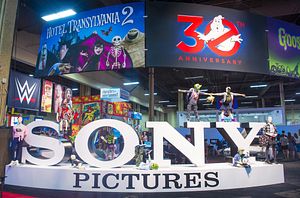The recent hacking of Sony, allegedly perpetrated by North Korea, and its aftermath raise salient issues about the tension between free speech and national security in the new troubling era of cyber warfare. These issues should engender a debate about how this tension can resolved so as to protect free speech while forestalling a cyber Armageddon.
What is not in dispute, in a free society such as the U.S., is a film studio’s right to exercise its freedom of speech. Rather, the issue is the impact the exercise of this right can have on national security and what U.S. society as a whole should decide about the importance of protecting this right while also protecting U.S. national security.
What was troubling about the Sony hacking was how Sony’s provocation of North Korea with the planned release of The Interview had the net effect of forcing the U.S. government into a position of having to defend Sony’s right to release the film so as to forestall the impression that the U.S. as a nation had capitulated to foreign cyber terror and blackmail. Thus, what started as a private movie studio’s action and subsequent cyber attack on a private business escalated, in effect, into a cyber attack on the U.S. national security with the U.S. president weighing in on the matter and vowing to retaliate.
Unquestionably, Sony had the right of free speech to make a movie featuring the assassination of the sitting sovereign of a foreign state, though some may object to such a film. Rather, what is of import here is whether Sony’s exercise of this right was in the best interests of the U.S. national security. Although many in the U.S. make fun of and mock Kim Jong-un as if he were a “Dr. Evil” from the Austin Powers film franchise, the fact is that North Korea is a nuclear power with a significant and growing cyber attack capability. Pyongyang has been developing nuclear-tipped ICBMs and SLBMs that can reach the U.S. mainland and, according to some analysts, already possesses the ability to launch an EMP attack that can paralyze the US national power grid. In provoking Pyongyang, a fiercely nationalistic regime centered on the worship of the Kim dynasty, which, in all likelihood, is secretly paranoid about a U.S. attempt to force regime change through assassinating Kim Jong-un, Sony took on a potential risk of inviting a North Korean cyber reprisal without adequately shoring up its own shaky cyber defenses. In the resulting fallout, for which Sony was unprepared, the U.S. as a nation suffered a setback as Sony’s decision to cancel the film’s release was seen around the world as a U.S. national capitulation to foreign cyber terror and blackmail.
A question here is: Would Sony or any other U.S. film studio think about making a movie featuring the CIA assassination of, say, Vladimir Putin, knowing that Russia is a nuclear superpower that can annihilate the U.S. with the push of a launch button and that Russia has a strong cyber attack capability, especially given that Putin is already under pressure from Western sanctions and an economic crisis? While making such a film is clearly Sony’s right, it is probably not in the best interests of U.S. national security, as such a movie may only inflame tensions and invite a Russian backlash. In the same vein, making a film featuring the CIA assassination of, say, Xi Jinping or even Barack Obama, while protected by free speech, would probably not be in the best U.S. national interest.
None of this is to advocate, by any stretch of imagination, a return to a McCarthyite era of censorship, self-censorship, and witch-hunts. Rather, it is a call for a robust and reasoned national debate on the tension between free speech and national security in the new age of cyber warfare. The problem is how to manage foreign cyber attacks elicited by and directed at private U.S. entities, and stop from escalating into an all-out cyber or conventional war at the national level. Because it is sometimes hard to identify the perpetrator of cyber terror and because certain nations are better shielded from cyber attacks, it is possible for a foreign entity or nation to inflict massive destruction on the U.S. while escaping damage from a punitive U.S. response, which may be ineffective, never materialize, or hit the wrong target. In this asymmetric cyber warfare, mutual deterrence can fail, which increases the incentive for more cyber attacks, thus giving rise to an open-ended escalation of cyber warfare. With the U.S. national power grid and parts of the U.S. economy vulnerable to cyber terror, the U.S. as a nation is not well prepared for cyber warfare and must strengthen its cyber security. U.S. private entities and industries, including Hollywood and other parts of the media/entertainment industry, have a role to play in contributing to U.S. national security. While they all have their right to free speech, it is incumbent upon them to realize that with freedom comes responsibility and that while everything is possible, not everything may be judicious.
Jongsoo Lee is Senior Managing Director at Brock Securities LLC and Center Associate at Davis Center for Russian and Eurasian Studies, Harvard University. Author of The Partition of Korea After World War II: A Global History, Lee served as Editor-in-Chief of Harvard Asia Quarterly and received his Ph.D. from Harvard University. The opinions expressed in this essay are solely his own. He can be followed on Twitter at @jameslee004
































